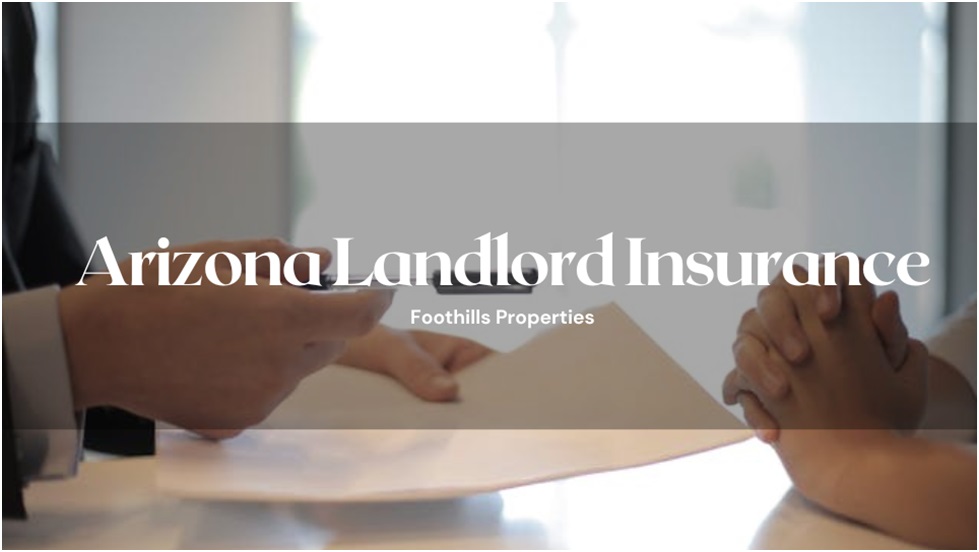
Owning rental properties in Arizona can be a lucrative investment, but it also comes with its own set of challenges and risks.
One essential aspect of being a landlord is ensuring that you have the right insurance coverage to protect your investment. This is where landlord insurance comes into play.
In this guide, Foothills Properties will tell you everything you need to know about Arizona Landlord Insurance.
What is Landlord Insurance?
Landlord insurance is a type of property insurance designed specifically for rental properties. It covers the unique risks associated with renting out properties, which are not typically covered by standard homeowner's insurance policies.
This insurance not only protects the physical structure of your property but also offers liability coverage and, in some cases, coverage for lost rental income.
Why Do You Need Landlord Insurance in Arizona?
Arizona's unique climate and diverse rental market make landlord insurance a necessity for property owners. Here are a few reasons why:
- Protection Against Natural Disasters: Arizona is prone to natural disasters such as wildfires, floods, and storms. Landlord insurance helps cover the cost of repairs or rebuilding in the event of damage caused by these events.
- Liability Coverage: As a landlord, you are responsible for the safety of your tenants. If a tenant or visitor is injured on your property, you could be held liable. Landlord insurance provides liability coverage, helping you cover legal fees and medical costs.

- Protection Against Tenant Damage: While most tenants take good care of rental properties, accidents happen. Landlord insurance can cover damage caused by tenants, such as broken windows, water damage, or even vandalism.
- Loss of Rental Income: If your property becomes uninhabitable due to a covered peril, landlord insurance can help compensate for the lost rental income while repairs are being made.
What Does Arizona Landlord Insurance Cover?
Landlord insurance policies can vary, but most offer a combination of the following coverages:
- Property Damage: This covers damage to the physical structure of your rental property caused by fire, lightning, wind, hail, and other covered perils. It may also cover detached structures such as garages or sheds.
- Liability Protection: This coverage protects you if someone is injured on your property. It can help pay for medical expenses, legal fees, and settlements or judgments.
- Loss of Rental Income: If your rental property is damaged by a covered event and becomes uninhabitable, this coverage compensates you for the lost rental income during the repair period.
- Personal Property Coverage: If you provide appliances, furniture, or other items for your tenants, this coverage helps protect those items in case of damage or theft.
- Optional Coverages: Depending on your needs, you may want to add optional coverages such as flood insurance, earthquake insurance, or coverage for landlord-owned contents.

Choosing the Right Landlord Insurance Policy
- Assess Your Risks: Evaluate the specific risks associated with your rental property. Consider the location, the type of property, and any additional features that might require extra coverage.
- Compare Quotes: Obtain quotes from multiple insurance providers. Make sure to compare the coverage options, limits, deductibles, and premiums to find the best policy for your needs.
- Understand the Policy: Carefully read the terms and conditions of the policy. Understand what is covered, what is excluded, and any limitations or conditions that apply.
- Work with an Insurance Agent: An experienced insurance agent can help you navigate the complexities of landlord insurance and ensure that you have the right coverage in place.
Tips for Reducing Your Landlord Insurance Premiums
- Increase Your Deductible: Opting for a higher deductible can lower your premium. Just make sure you have enough savings to cover the deductible in case of a claim.
- Bundle Policies: Many insurance companies offer discounts if you bundle your landlord insurance with other policies, such as auto or personal home insurance.
- Improve Property Security: Installing security systems, smoke detectors, and fire extinguishers can lower your risk and may qualify you for discounts.
- Maintain a Good Credit Score: Insurance companies often use credit scores to determine premiums. Maintaining a good credit score can help you secure lower rates.
- Regular Property Maintenance: Keeping your property well-maintained reduces the risk of damage and claims, which can help keep your premiums low.

Common Mistakes to Avoid
- Underinsuring Your Property: Ensure that your policy covers the full replacement cost of your property. Underinsurance can leave you with significant out-of-pocket expenses.
- Ignoring Liability Coverage: Liability claims can be costly. Make sure your policy includes adequate liability coverage to protect your assets.
- Not Updating Your Policy: If you make improvements or changes to your property, update your insurance policy to reflect the increased value or new risks.
- Overlooking Exclusions: Understand what is not covered by your policy. Common exclusions include flood and earthquake damage, which may require separate policies.
How Can Property Managers Help?
Property managers can be an invaluable asset for landlords, especially when it comes to managing insurance-related matters. Here are several ways property managers can assist:
- Routine Inspections and Maintenance: Property managers can conduct regular inspections to identify potential issues before they become major problems. They ensure that the property is well-maintained, which can prevent claims and keep insurance premiums low.
- Tenant Screening: By thoroughly screening tenants, property managers help reduce the risk of property damage and liability claims. They check references, verify employment, and conduct background checks to ensure reliable tenants.
- Record Keeping: Property managers maintain detailed records of inspections, maintenance, and tenant interactions. This documentation is crucial in supporting insurance claims and demonstrating compliance with policy conditions.
Conclusion
Landlord insurance is a crucial investment for anyone renting out properties in Arizona. It provides peace of mind by protecting your property, covering liability, and compensating for lost rental income.
By understanding the coverage options, assessing your risks, and choosing the right policy, you can safeguard your investment and ensure the long-term success of your rental business.
Foothills Properties can help you manage your rental properties, helping your rental business become a success. Contact us today to learn more about our property management services!








